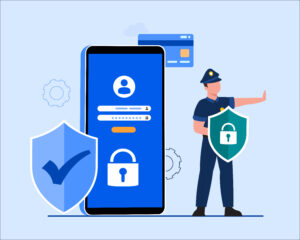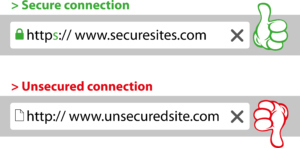
- July 31, 2020
- 9 min read
- Tips & Info
 So, you may be developing your own site or trying to get your foot into the tech-space. You’ve come across the phrase, SSL, being juggled around freely and casually, but you might not even know what it is. Hopefully, this article provides all the help you need in understanding the term, the usefulness, and the benefit of SSL certificates, so that you’ll know how to, and why, to get an SSL certificate.
So, you may be developing your own site or trying to get your foot into the tech-space. You’ve come across the phrase, SSL, being juggled around freely and casually, but you might not even know what it is. Hopefully, this article provides all the help you need in understanding the term, the usefulness, and the benefit of SSL certificates, so that you’ll know how to, and why, to get an SSL certificate.
In the realm of security, in short, we can answer the question straight-away. Yes, you’ll need an SSL certificate for any website you may be developing or holding. Simply put, any website you may have will come up as HTTP. Everybody knows about this, but something that is lesser known is that if you have an SSL certificate (also known as Secure Sockets Layer), your website will be converted into an https. While this doesn’t make a huge difference on your website at all on first glance, many browsers, including the big-boys of Google and Firefox, have begun rolling out warnings to users to try to access only HTTP sites, so it’s a first warning sign to any user NOT to access HTTP sites. This is a good thing, as it can protect users from harmful sites, but if you’re only just starting up, this is very inconvenient, as it often stops new creators at the first hurdle. This is the first of many reasons why you should get an SSL certificate, and we’ll explain more about it as we go along, but hopefully, this is reason enough!
Even entry-level internet users know that online fraud and information data breaches are on the rise in the cyber-space, and an SSL certificate acts as a tag on your site, letting people at home know that they are in the all-clear. Think of a health and safety inspection accreditation, it’s a signpost to all on your service. It’s at its most common on sites that handle your bank information data, financial data, home address, phone numbers, and more, letting people at home know that they’re safe. While your website may not be handling home-users data like that, the safety of the user is still at hand, and as stated before, if you don’t have a certificate, many people won’t even attempt to access your site.
So What Does An SSL Do?
So, an SSL certificate encrypts the data that is sent from a user’s computer to the target site, and then all the way back. Think about an open piece of paper in the mail, sent somewhere, and then sent back. We’ll call this HTTP. Well, people can read the piece of paper, right? An SSL encrypts (or wraps up) this piece of paper between the user and the site. It makes it impossible for the data to be breached along the line and assures the user that the site is safe. What could it mean for you as a website owner? Well, the website communicates with its user while on the site in order to share information, so that they can buy or access products and services safely with you online. Adding the SSL certificate is an approval of the safety of your services, creating safe connections with the user. The major fact to understand here, is that anything that needs to be secure while online (even an e-mail), should be under the protective umbrella that an SSL provides.
You may have, on your own terms, gone to some great length to make your website more secure without the need for an SSL. However, there will always be cracks in the safety of the site, as hackers and phishing scammers will always develop new ways to get around it. If you’ve never attempted any security improvements too, an SSL is for everyone who doesn’t have one, essentially. It was once sufficient to use antivirus software on your computer, and firewalls to help with the load, but with the internet ever-so-popular, and scammers ever-evolving also, it’s near-impossible for software to keep up. An SSL nips a scammer in the bud, stopping them at the first hurdle. Also, if a scammer is going to the extent of stealing your information from a site, they’re up to no good. They’ll use your information maliciously, stealing your bank details for your money, selling your information to sharing sites, or as severe as identity theft in some cases. As a website owner, it’s your duty to host protection for your users, and with SSL’s not being so complex to obtain, it would be your duty as the provider to help your users stay protected.
The Advantages, Summed Up!
- High encryption levels, up to 256-bit, to protect sensitive user-data! This essentially means that the imaginary package in the mail is difficult to open and that the user information is protected from external eyes looking in.
- Provides this strong encryption to avoid data-phishing and scams/attacks.
- It stops the website itself from being attacked by scammers/hackers, including eavesdropping of data and man-in-the-middle attacks (where the scammer sees everything going into and out of the website).
- Ensures to the user that you’re safe, for shopping experiences, and more. This can also, though you may not know it, provide a positive influence in Google’s evaluation of your website (pushing up your website higher in search-bars). They recently announced this, so it’s useful to take this on board to run up the clicks on your site!
- Users are rest-assured, being told they have a ‘Secure Connection’ on the site, rather than clicking away at the warning sign of a non-secure HTTP site.
How Do I Get An SSL?
So, if you already have a website, it may be because you’re using a hosting service. Non-SSL sites have cheap prices, and if you’ve gone for one of them, that may have been a reason for doing so. However, now, you might be regretting jumping the gun. If you haven’t started your website and you’re doing research, well, this part will be useful for both of these parties. An SSL can be found for a very reasonable monthly cost, and the traffic that an SSL site brings in more than a non-SSL site, so it’s definitely worth it. You can find SSL certificates at website-hosting websites, or if you have your own non-SSL website, then it can provide an SSL for your site. Look around, as prices can fluctuate, but be warned. There are no good free SSL’s and they’re usually the very scams we set out to avoid. Don’t be afraid to pay subscriptions for trustworthy SSL providers, because they are the protection we want and need, and the price isn’t as much of a bother as the theft of user data. Remember that the reason we’re here is to stay safe.
What SSL Should I Use?
So, yes, there are multiple, and it can be confusing to get into the realm of what exactly you should use. Here’s some distinction to help you on your way while deciding. There are different ways to signal to your users that you’re secure, either by showing to the user that you’re part of an organisation or by simply showing the https sign.
How many domain names do I have, that need securing?
Most readers only have one website. Therefore, single-domain SSL is needed. These come as standard, OV, and EV. However, if you need to secure multiple sub-domains under one organisation, you should look out for a ‘Wildcard SSL’. Say, for example, you secure ‘mysite.com’. How you can secure ‘blog.mysite.com’ AND ‘shop.mysite.com’ too. These are available as standard or OV too.
 Can I Use Shared SSL? Do I need my own certificate?
Can I Use Shared SSL? Do I need my own certificate?
Both shared and dedicated versions of SSL fulfill the primary aims of SSL, to provide safe user experience, and transmit data in encryption over networks. Whether you choose either depends on your personal benefit and specific needs, as well as how much money you have to spend. One of the main differences is how the SSL will appear. A shared URL will look something like ‘https://yourserver.yourhost.com’, and the dedicated SSL will look like ‘https://yourname.com’. Many people are attracted to server SSL’s on shared certificates because of the speed, simplicity, and the cost is cheaper. Saving money can free up some finances to use for other things. However, building a higher business profile for the future, and with intent to sell a product, may encourage you to desire the clean-cut look of a dedicated SSL. As well as safety, this is a world of customisation, so do with it what you will!
Rounding It All Up
To Conclude, we’re glad that you made it all the way through this article. The benefits of an SSL on the website are confounding for the website host, as it can help bring new traffic and a greater overall return on website viewership to the site, without the warning of ‘Not Protected’ plaguing your site and preventing customers or viewers. As well as this, you as the host are bringing an essential service for your viewers, ensuring them that they’re in safe hands with you, and they’re out of the clutches of scammers and hackers from getting to them. If your intent is to grow your website to be larger, it will soon attract malicious intent also, so an SSL is a high and strong brick wall against them. And lastly, the development of Google’s ranking system, with them being the biggest search engine by a large margin, means that you can have a slice of the pie, and become more relevant than a majority of the sites on the browser. For the small cost on SSL providers sites, it’s a no-brainer for the benefits it brings back to the user. We deem an SSL essential for the aspiring website-owners out there, so to wrap up our long-form answer, yes. You’ll need an SSL! We hope this helps you on your way to getting website-success, and we wish you well in your endeavour to get your SSL certificate.








